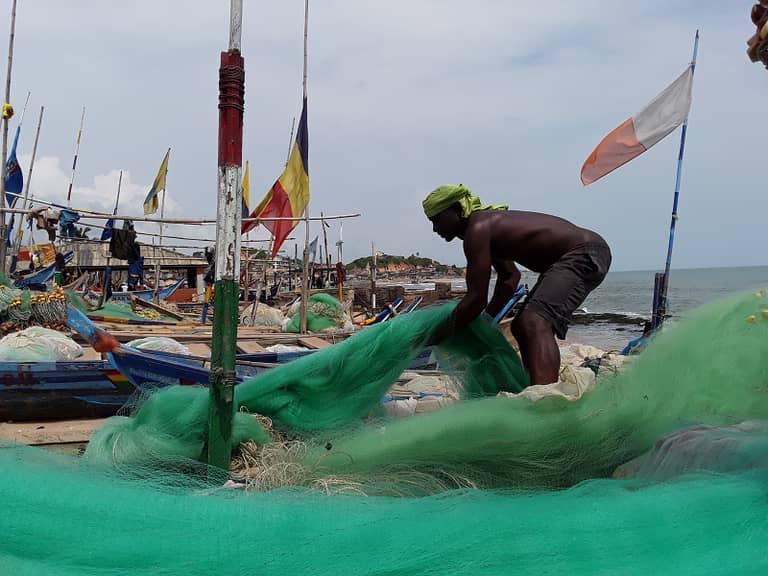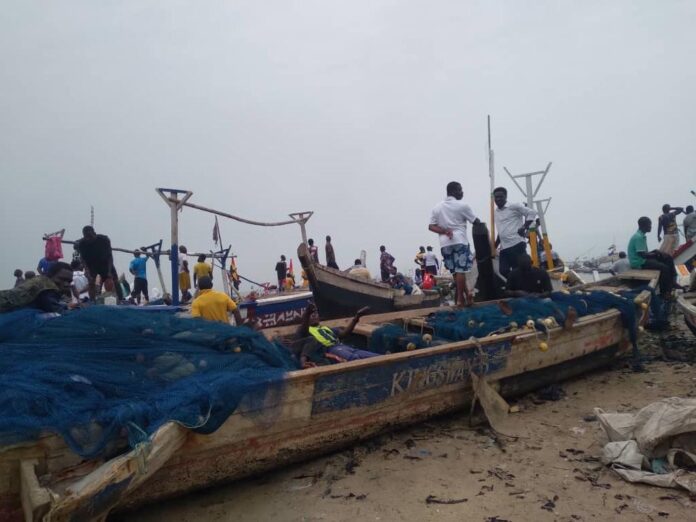
Picture Caption: Beneath the tranquil waves of our coastal waters, a silent battle is being fought. It’s a struggle between traditional fishing practices and the perilous legacy of illegal fishing nets.*
These illegal nets, including the monofilament net, have become an unspoken threat to our seas and, more importantly, our health.
Author: Harriet Akosua Frimpomaa Kwakye
A Net for Every Catch
Fishing nets come in diverse forms, each designed for specific fishing methods and target species. From the delicate artistry of cast nets to the dragnet of trawlers, these tools have shaped the livelihoods and traditions of coastal communities for generations.
However, in the shadows of these legitimate fishing practices lie the ominous presence of illegal nets that cast a long, dark shadow on the serene coastal life.
The Rogues of the Seas
Among the illegal fishing nets, the monofilament nets, Okalanshwe, and rubber nets stand out as culprits in this aquatic crime. These illicit nets are a menacing presence in our waters, causing an array of environmental and health problems.
The monofilament net, in particular, presents a unique threat. The rubber net poses a double-edged sword of danger. It’s a menace to marine life and an unspoken health risk to those dependent on these waters.
A Lethal Embrace
These illegal nets are non-biodegradable and unforgiving, threatening marine life in the cruelest of ways. Fish, both intended for consumption and innocent bystanders, fall victim to its relentless grip.
When portions of these rubber nets tear, the fish could be trapped in it, and instead of the artisanal fishers catching these fish for us to eat, it dies in the net.
The loss goes beyond the individual fish, affecting livelihoods and ecosystems. Although monofilament nets are not illegal in Ghana and are sold on the open market, they are only meant for aquaculture and not marine fishing.
However, some fishers intentionally buy these nets meant for aquaculture farming and not for marine fishing. According to the Environmental Justice Foundation (EJF), the use of unauthorized fishing nets alone is estimated to incur a cost of over US$30 million annually in Ghana.
This sum is distinct from the revenues lost due to other unlawful fishing techniques such as chemical and light-fishing.
The Battle Begins
In 2022, the Ministry of Fisheries and Aquaculture Development embarked on a mission to penalize fishermen who use illegal fishing nets at sea. But in the face of these dangers, a battle is brewing.
Concerned individuals are uniting to protect the seas. Education programs are being launched by the fisheries commission, EFJ, Hen Mpoano, and many other organizations, teaching the importance of sustainable fishing practices. Fisheries regulations are being strengthened, and penalties for using illegal gears are becoming more stringent. The fight is uphill, but it’s a battle for life itself – for the oceans, the communities, and the generations to come.
A Call to Action
It’s time to bring to light the unseen menace lurking in Ghana’s coastal waters. The story of illegal fishing nets, the threat of rubber nets, and the efforts to combat them is not just a matter of environmental concern; it’s a reminder of the symbiotic relationship between our actions and the waters that sustain us.
The battle for Ghana’s seas and its future begins here, beneath the waves, where every tangled life counts.












































